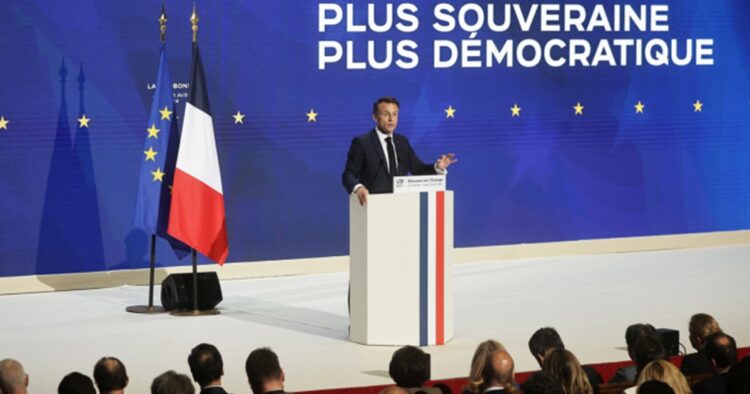Recently, in an address at Sorbonne University, French President Emmanuel Macron urged for bolstered European defenses and asserted the need for the continent to stand independently from the United States.
With just three years remaining in his final presidential term and having lost his parliamentary majority in 2022, Macron aimed to reaffirm his leadership vigor and forward-thinking stance amidst criticism.
Expressing concern over potential risks to the European Union’s stability, Macron highlighted the imperative for enhanced military capabilities, closer defense collaboration with post-Brexit Britain, and heightened cybersecurity measures.
He emphasized the importance of reducing reliance on American defense infrastructure, advocating for a stronger European defense industry and urging preferential procurement of European-made military equipment.
Macron underscored the economic challenges facing Europe, citing global trade disruptions and the necessity for the EU to assert leadership in key technological domains such as artificial intelligence, quantum computing, and renewable energy. He also proposed exemptions to EU competition rules to support sectors like AI and green energy, facing stiff competition from the United States and China.
Recognizing the evolving geopolitical landscape marked by conflicts like the war in Gaza and Russia’s actions in Ukraine, Macron positioned his speech as France’s contribution to the EU’s strategic agenda for the next five years.
He aimed to galvanize EU leaders to prioritize European autonomy and strategic interests in the face of increasing global tensions.
Despite Macron’s efforts, challenges loom on the horizon. His personal popularity has waned, and his centrist party, Renew, faces tough competition from the far-right Rassemblement National (RN) in the upcoming European Parliament elections.
Moreover, opinion polls suggest Renew could slip to the fourth position in the European Parliament, potentially limiting Macron’s influence within EU institutions.
As Macron seeks to navigate these obstacles, his vision for a more assertive and economically independent Europe resonates with some, while others question the feasibility and motivations behind his proposals.
The coming months will reveal the extent to which Macron’s agenda shapes the EU’s strategic direction and his political fortunes at home.

















Comments